Nursing Ethics: Analyzing Ethical Issues in Healthcare - Assignment
VerifiedAdded on 2022/11/19
|11
|3380
|334
Essay
AI Summary
This essay delves into the ethical considerations within a nursing scenario, focusing on the case of Anh, a nurse, and her patient, Maddie. The essay analyzes the ethical issues, particularly relational ethics, communication, and therapeutic relationship management. It explores the ethical values and principles of nursing, including autonomy, non-maleficence, beneficence, and justice, and how these principles guide nurses in their interactions with patients. The essay examines the importance of communication, mutual respect, and trust in building effective nurse-patient relationships, and discusses the implications of maintaining professional boundaries. It also addresses the application of ethical codes and principles in resolving dilemmas, such as Maddie's request for Anh's personal details after discharge, and the importance of maintaining patient confidentiality. The essay emphasizes the significance of ethical decision-making in providing quality patient care and upholding professional standards.
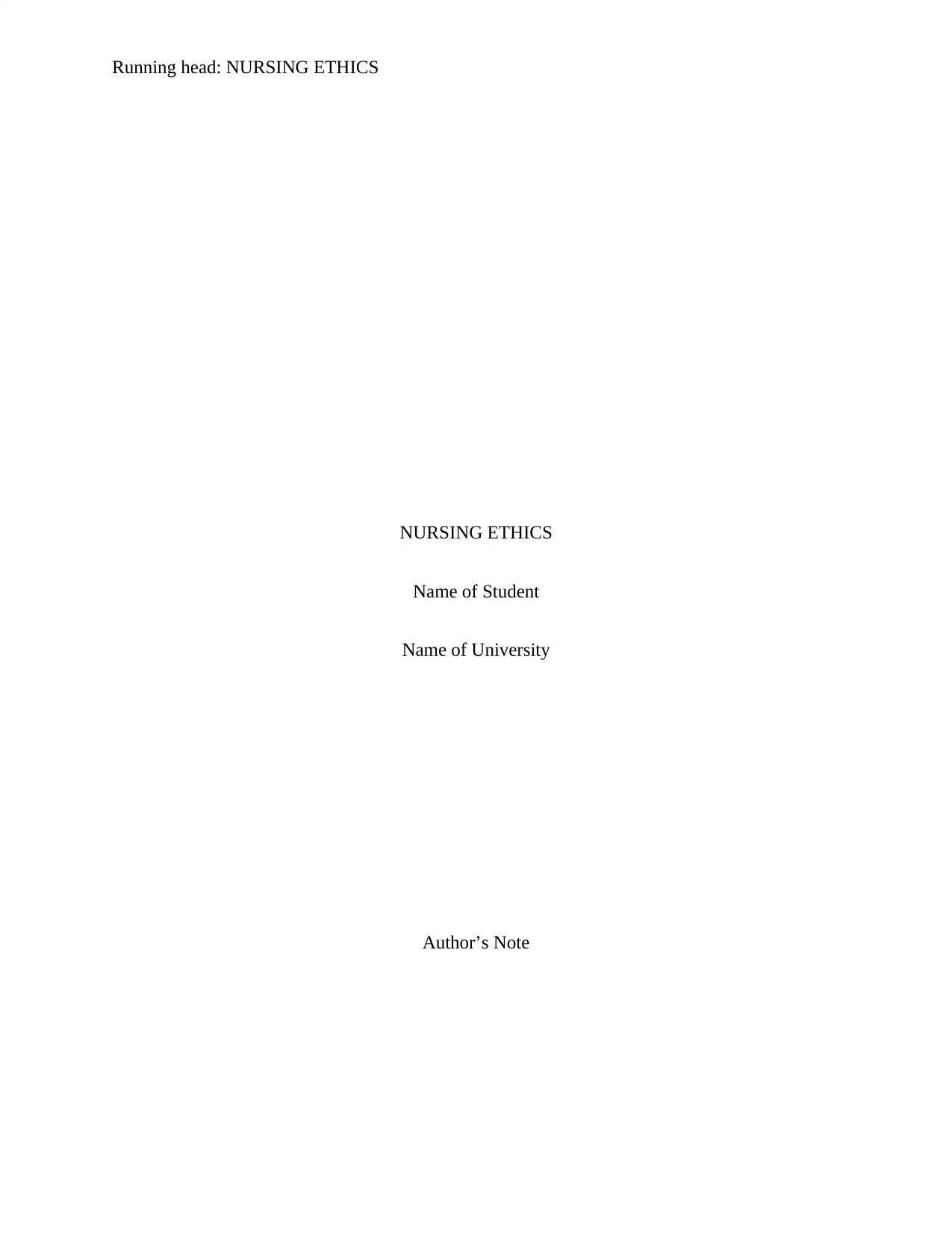
Running head: NURSING ETHICS
NURSING ETHICS
Name of Student
Name of University
Author’s Note
NURSING ETHICS
Name of Student
Name of University
Author’s Note
Paraphrase This Document
Need a fresh take? Get an instant paraphrase of this document with our AI Paraphraser
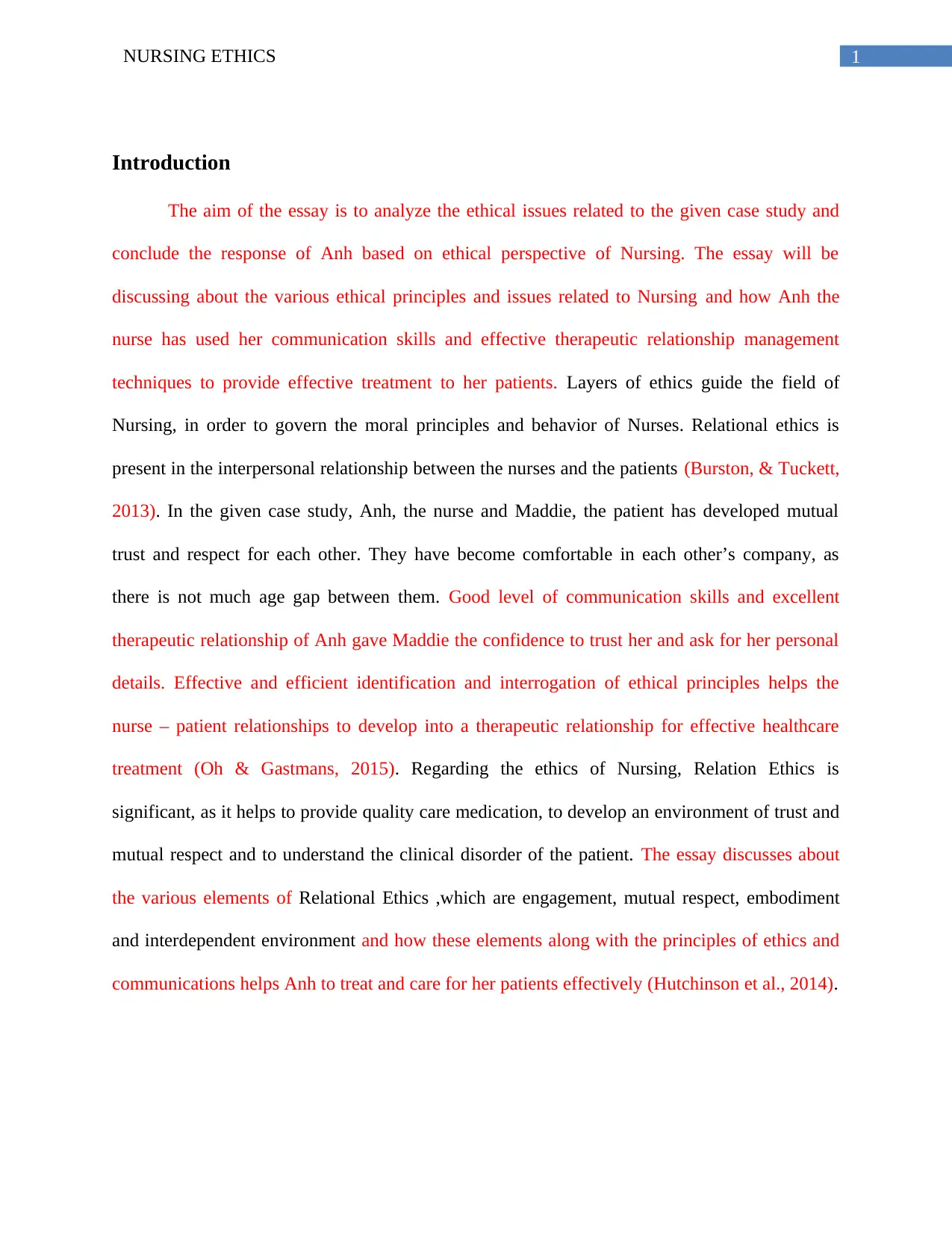
1NURSING ETHICS
Introduction
The aim of the essay is to analyze the ethical issues related to the given case study and
conclude the response of Anh based on ethical perspective of Nursing. The essay will be
discussing about the various ethical principles and issues related to Nursing and how Anh the
nurse has used her communication skills and effective therapeutic relationship management
techniques to provide effective treatment to her patients. Layers of ethics guide the field of
Nursing, in order to govern the moral principles and behavior of Nurses. Relational ethics is
present in the interpersonal relationship between the nurses and the patients (Burston, & Tuckett,
2013). In the given case study, Anh, the nurse and Maddie, the patient has developed mutual
trust and respect for each other. They have become comfortable in each other’s company, as
there is not much age gap between them. Good level of communication skills and excellent
therapeutic relationship of Anh gave Maddie the confidence to trust her and ask for her personal
details. Effective and efficient identification and interrogation of ethical principles helps the
nurse – patient relationships to develop into a therapeutic relationship for effective healthcare
treatment (Oh & Gastmans, 2015). Regarding the ethics of Nursing, Relation Ethics is
significant, as it helps to provide quality care medication, to develop an environment of trust and
mutual respect and to understand the clinical disorder of the patient. The essay discusses about
the various elements of Relational Ethics ,which are engagement, mutual respect, embodiment
and interdependent environment and how these elements along with the principles of ethics and
communications helps Anh to treat and care for her patients effectively (Hutchinson et al., 2014).
Introduction
The aim of the essay is to analyze the ethical issues related to the given case study and
conclude the response of Anh based on ethical perspective of Nursing. The essay will be
discussing about the various ethical principles and issues related to Nursing and how Anh the
nurse has used her communication skills and effective therapeutic relationship management
techniques to provide effective treatment to her patients. Layers of ethics guide the field of
Nursing, in order to govern the moral principles and behavior of Nurses. Relational ethics is
present in the interpersonal relationship between the nurses and the patients (Burston, & Tuckett,
2013). In the given case study, Anh, the nurse and Maddie, the patient has developed mutual
trust and respect for each other. They have become comfortable in each other’s company, as
there is not much age gap between them. Good level of communication skills and excellent
therapeutic relationship of Anh gave Maddie the confidence to trust her and ask for her personal
details. Effective and efficient identification and interrogation of ethical principles helps the
nurse – patient relationships to develop into a therapeutic relationship for effective healthcare
treatment (Oh & Gastmans, 2015). Regarding the ethics of Nursing, Relation Ethics is
significant, as it helps to provide quality care medication, to develop an environment of trust and
mutual respect and to understand the clinical disorder of the patient. The essay discusses about
the various elements of Relational Ethics ,which are engagement, mutual respect, embodiment
and interdependent environment and how these elements along with the principles of ethics and
communications helps Anh to treat and care for her patients effectively (Hutchinson et al., 2014).
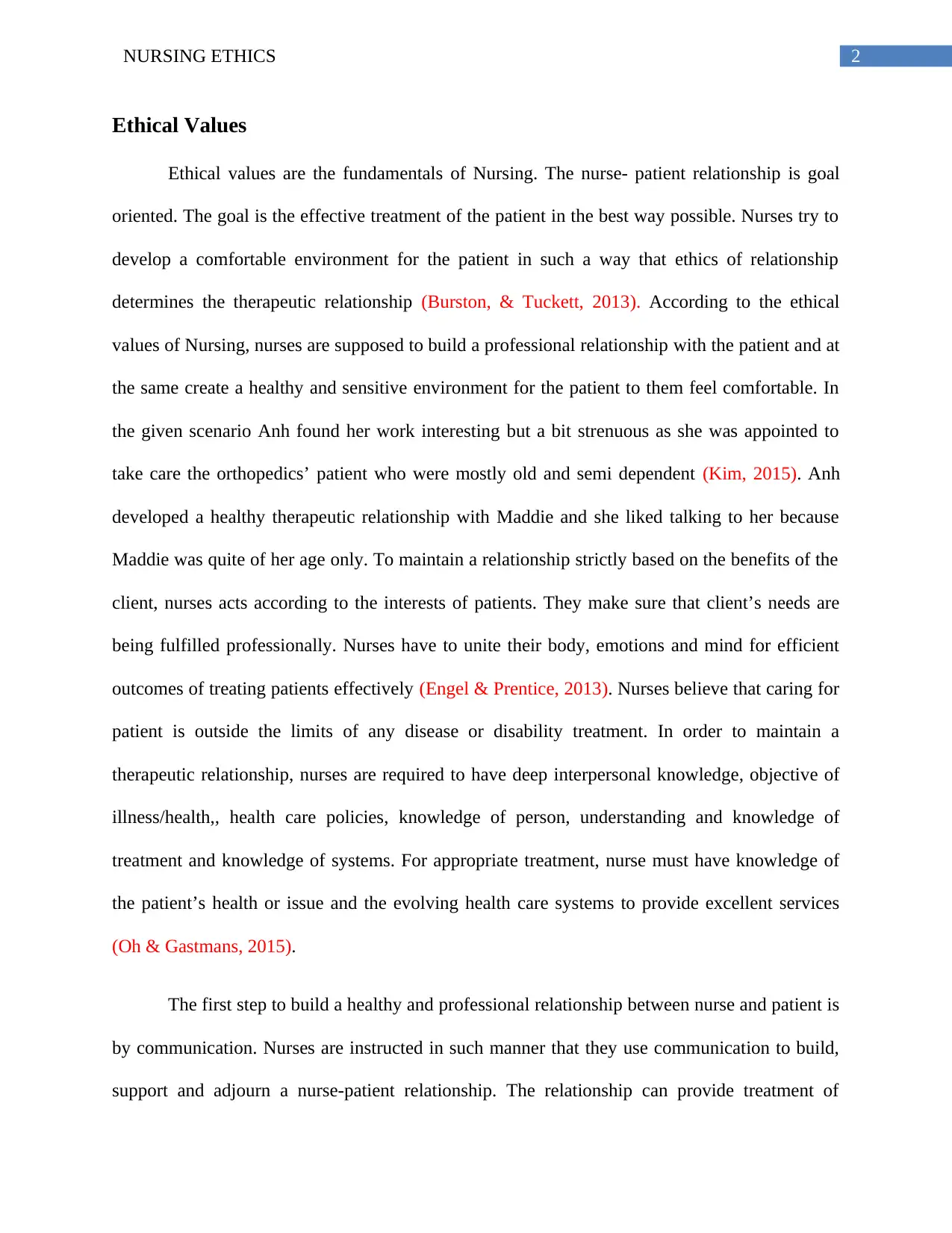
2NURSING ETHICS
Ethical Values
Ethical values are the fundamentals of Nursing. The nurse- patient relationship is goal
oriented. The goal is the effective treatment of the patient in the best way possible. Nurses try to
develop a comfortable environment for the patient in such a way that ethics of relationship
determines the therapeutic relationship (Burston, & Tuckett, 2013). According to the ethical
values of Nursing, nurses are supposed to build a professional relationship with the patient and at
the same create a healthy and sensitive environment for the patient to them feel comfortable. In
the given scenario Anh found her work interesting but a bit strenuous as she was appointed to
take care the orthopedics’ patient who were mostly old and semi dependent (Kim, 2015). Anh
developed a healthy therapeutic relationship with Maddie and she liked talking to her because
Maddie was quite of her age only. To maintain a relationship strictly based on the benefits of the
client, nurses acts according to the interests of patients. They make sure that client’s needs are
being fulfilled professionally. Nurses have to unite their body, emotions and mind for efficient
outcomes of treating patients effectively (Engel & Prentice, 2013). Nurses believe that caring for
patient is outside the limits of any disease or disability treatment. In order to maintain a
therapeutic relationship, nurses are required to have deep interpersonal knowledge, objective of
illness/health,, health care policies, knowledge of person, understanding and knowledge of
treatment and knowledge of systems. For appropriate treatment, nurse must have knowledge of
the patient’s health or issue and the evolving health care systems to provide excellent services
(Oh & Gastmans, 2015).
The first step to build a healthy and professional relationship between nurse and patient is
by communication. Nurses are instructed in such manner that they use communication to build,
support and adjourn a nurse-patient relationship. The relationship can provide treatment of
Ethical Values
Ethical values are the fundamentals of Nursing. The nurse- patient relationship is goal
oriented. The goal is the effective treatment of the patient in the best way possible. Nurses try to
develop a comfortable environment for the patient in such a way that ethics of relationship
determines the therapeutic relationship (Burston, & Tuckett, 2013). According to the ethical
values of Nursing, nurses are supposed to build a professional relationship with the patient and at
the same create a healthy and sensitive environment for the patient to them feel comfortable. In
the given scenario Anh found her work interesting but a bit strenuous as she was appointed to
take care the orthopedics’ patient who were mostly old and semi dependent (Kim, 2015). Anh
developed a healthy therapeutic relationship with Maddie and she liked talking to her because
Maddie was quite of her age only. To maintain a relationship strictly based on the benefits of the
client, nurses acts according to the interests of patients. They make sure that client’s needs are
being fulfilled professionally. Nurses have to unite their body, emotions and mind for efficient
outcomes of treating patients effectively (Engel & Prentice, 2013). Nurses believe that caring for
patient is outside the limits of any disease or disability treatment. In order to maintain a
therapeutic relationship, nurses are required to have deep interpersonal knowledge, objective of
illness/health,, health care policies, knowledge of person, understanding and knowledge of
treatment and knowledge of systems. For appropriate treatment, nurse must have knowledge of
the patient’s health or issue and the evolving health care systems to provide excellent services
(Oh & Gastmans, 2015).
The first step to build a healthy and professional relationship between nurse and patient is
by communication. Nurses are instructed in such manner that they use communication to build,
support and adjourn a nurse-patient relationship. The relationship can provide treatment of
⊘ This is a preview!⊘
Do you want full access?
Subscribe today to unlock all pages.

Trusted by 1+ million students worldwide
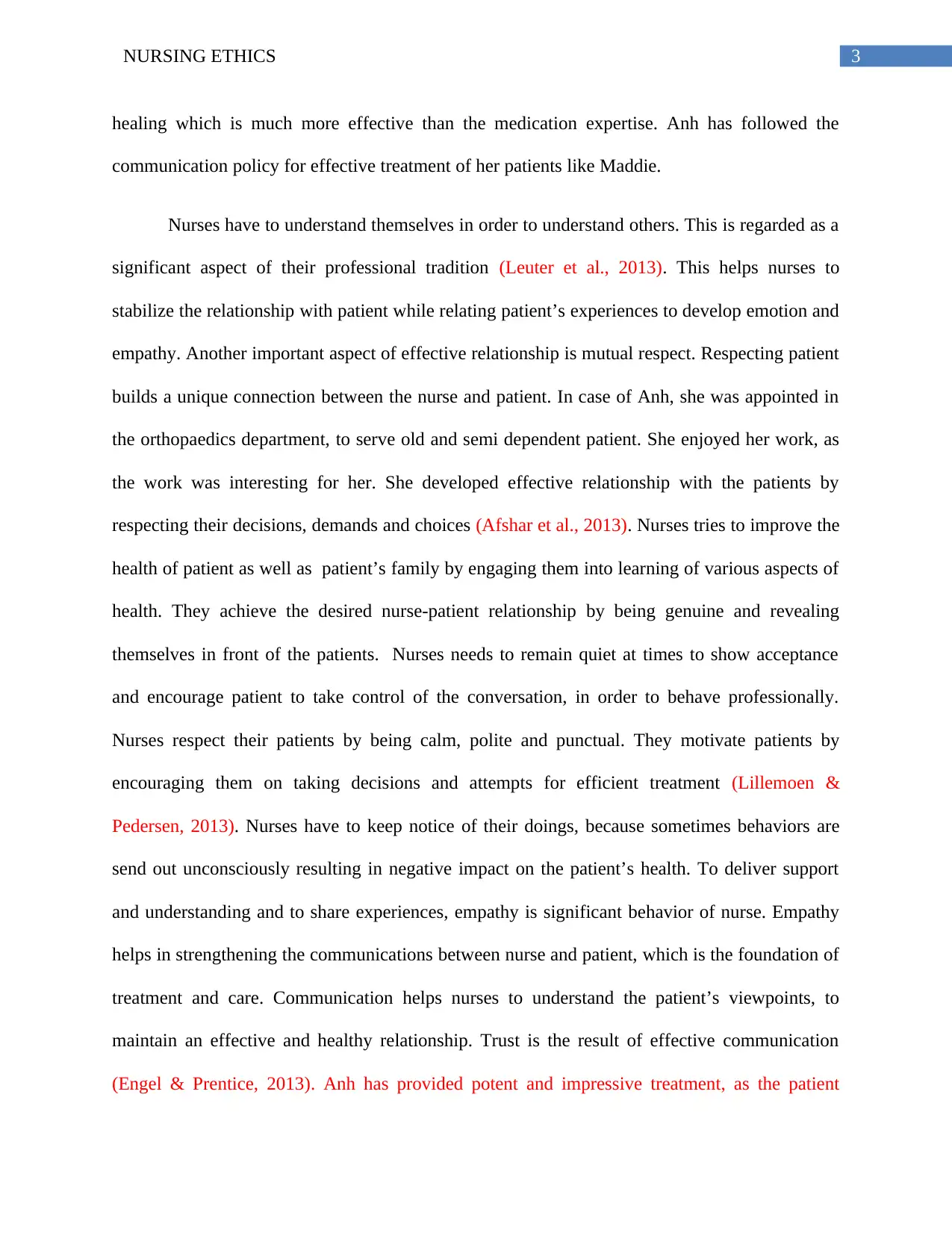
3NURSING ETHICS
healing which is much more effective than the medication expertise. Anh has followed the
communication policy for effective treatment of her patients like Maddie.
Nurses have to understand themselves in order to understand others. This is regarded as a
significant aspect of their professional tradition (Leuter et al., 2013). This helps nurses to
stabilize the relationship with patient while relating patient’s experiences to develop emotion and
empathy. Another important aspect of effective relationship is mutual respect. Respecting patient
builds a unique connection between the nurse and patient. In case of Anh, she was appointed in
the orthopaedics department, to serve old and semi dependent patient. She enjoyed her work, as
the work was interesting for her. She developed effective relationship with the patients by
respecting their decisions, demands and choices (Afshar et al., 2013). Nurses tries to improve the
health of patient as well as patient’s family by engaging them into learning of various aspects of
health. They achieve the desired nurse-patient relationship by being genuine and revealing
themselves in front of the patients. Nurses needs to remain quiet at times to show acceptance
and encourage patient to take control of the conversation, in order to behave professionally.
Nurses respect their patients by being calm, polite and punctual. They motivate patients by
encouraging them on taking decisions and attempts for efficient treatment (Lillemoen &
Pedersen, 2013). Nurses have to keep notice of their doings, because sometimes behaviors are
send out unconsciously resulting in negative impact on the patient’s health. To deliver support
and understanding and to share experiences, empathy is significant behavior of nurse. Empathy
helps in strengthening the communications between nurse and patient, which is the foundation of
treatment and care. Communication helps nurses to understand the patient’s viewpoints, to
maintain an effective and healthy relationship. Trust is the result of effective communication
(Engel & Prentice, 2013). Anh has provided potent and impressive treatment, as the patient
healing which is much more effective than the medication expertise. Anh has followed the
communication policy for effective treatment of her patients like Maddie.
Nurses have to understand themselves in order to understand others. This is regarded as a
significant aspect of their professional tradition (Leuter et al., 2013). This helps nurses to
stabilize the relationship with patient while relating patient’s experiences to develop emotion and
empathy. Another important aspect of effective relationship is mutual respect. Respecting patient
builds a unique connection between the nurse and patient. In case of Anh, she was appointed in
the orthopaedics department, to serve old and semi dependent patient. She enjoyed her work, as
the work was interesting for her. She developed effective relationship with the patients by
respecting their decisions, demands and choices (Afshar et al., 2013). Nurses tries to improve the
health of patient as well as patient’s family by engaging them into learning of various aspects of
health. They achieve the desired nurse-patient relationship by being genuine and revealing
themselves in front of the patients. Nurses needs to remain quiet at times to show acceptance
and encourage patient to take control of the conversation, in order to behave professionally.
Nurses respect their patients by being calm, polite and punctual. They motivate patients by
encouraging them on taking decisions and attempts for efficient treatment (Lillemoen &
Pedersen, 2013). Nurses have to keep notice of their doings, because sometimes behaviors are
send out unconsciously resulting in negative impact on the patient’s health. To deliver support
and understanding and to share experiences, empathy is significant behavior of nurse. Empathy
helps in strengthening the communications between nurse and patient, which is the foundation of
treatment and care. Communication helps nurses to understand the patient’s viewpoints, to
maintain an effective and healthy relationship. Trust is the result of effective communication
(Engel & Prentice, 2013). Anh has provided potent and impressive treatment, as the patient
Paraphrase This Document
Need a fresh take? Get an instant paraphrase of this document with our AI Paraphraser
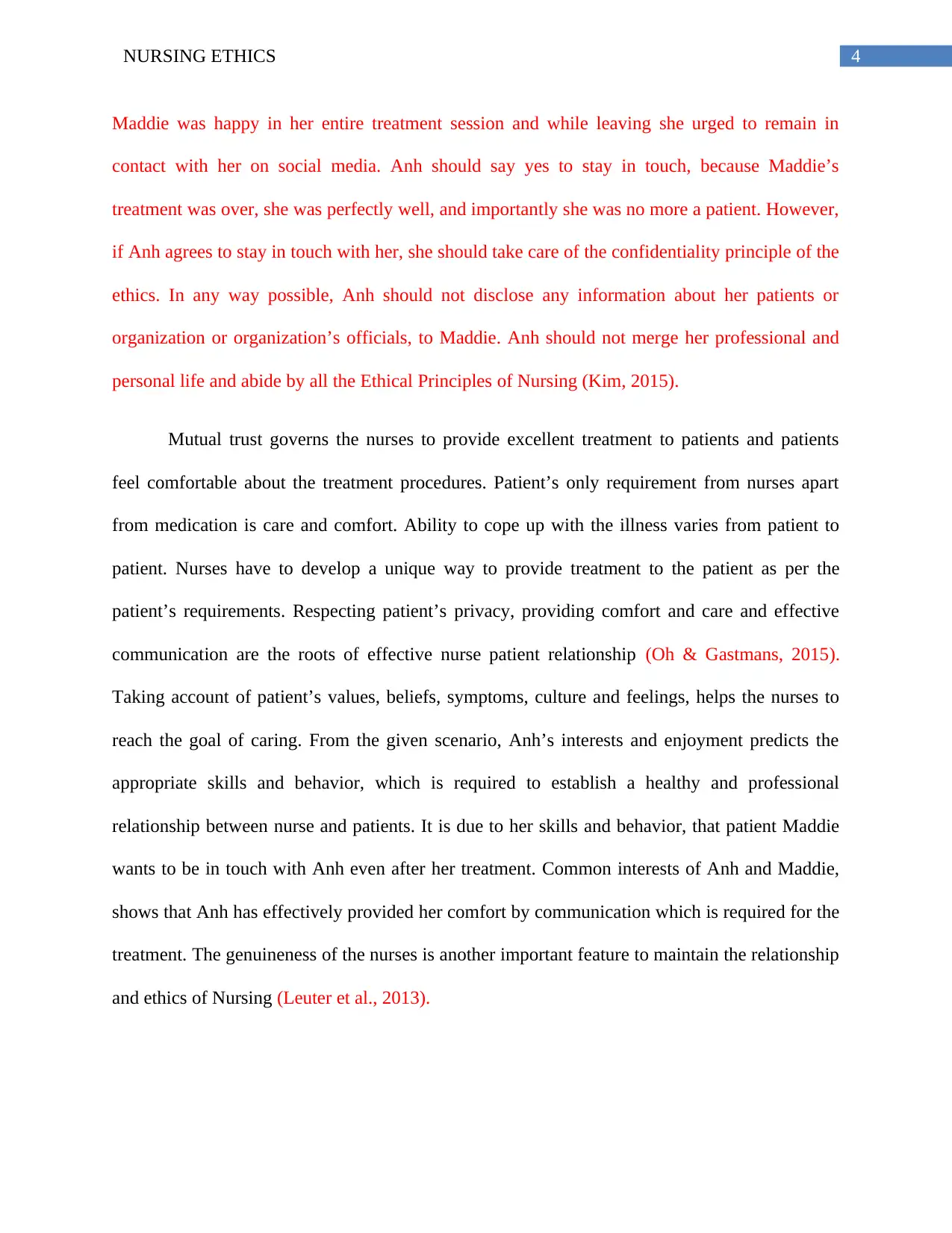
4NURSING ETHICS
Maddie was happy in her entire treatment session and while leaving she urged to remain in
contact with her on social media. Anh should say yes to stay in touch, because Maddie’s
treatment was over, she was perfectly well, and importantly she was no more a patient. However,
if Anh agrees to stay in touch with her, she should take care of the confidentiality principle of the
ethics. In any way possible, Anh should not disclose any information about her patients or
organization or organization’s officials, to Maddie. Anh should not merge her professional and
personal life and abide by all the Ethical Principles of Nursing (Kim, 2015).
Mutual trust governs the nurses to provide excellent treatment to patients and patients
feel comfortable about the treatment procedures. Patient’s only requirement from nurses apart
from medication is care and comfort. Ability to cope up with the illness varies from patient to
patient. Nurses have to develop a unique way to provide treatment to the patient as per the
patient’s requirements. Respecting patient’s privacy, providing comfort and care and effective
communication are the roots of effective nurse patient relationship (Oh & Gastmans, 2015).
Taking account of patient’s values, beliefs, symptoms, culture and feelings, helps the nurses to
reach the goal of caring. From the given scenario, Anh’s interests and enjoyment predicts the
appropriate skills and behavior, which is required to establish a healthy and professional
relationship between nurse and patients. It is due to her skills and behavior, that patient Maddie
wants to be in touch with Anh even after her treatment. Common interests of Anh and Maddie,
shows that Anh has effectively provided her comfort by communication which is required for the
treatment. The genuineness of the nurses is another important feature to maintain the relationship
and ethics of Nursing (Leuter et al., 2013).
Maddie was happy in her entire treatment session and while leaving she urged to remain in
contact with her on social media. Anh should say yes to stay in touch, because Maddie’s
treatment was over, she was perfectly well, and importantly she was no more a patient. However,
if Anh agrees to stay in touch with her, she should take care of the confidentiality principle of the
ethics. In any way possible, Anh should not disclose any information about her patients or
organization or organization’s officials, to Maddie. Anh should not merge her professional and
personal life and abide by all the Ethical Principles of Nursing (Kim, 2015).
Mutual trust governs the nurses to provide excellent treatment to patients and patients
feel comfortable about the treatment procedures. Patient’s only requirement from nurses apart
from medication is care and comfort. Ability to cope up with the illness varies from patient to
patient. Nurses have to develop a unique way to provide treatment to the patient as per the
patient’s requirements. Respecting patient’s privacy, providing comfort and care and effective
communication are the roots of effective nurse patient relationship (Oh & Gastmans, 2015).
Taking account of patient’s values, beliefs, symptoms, culture and feelings, helps the nurses to
reach the goal of caring. From the given scenario, Anh’s interests and enjoyment predicts the
appropriate skills and behavior, which is required to establish a healthy and professional
relationship between nurse and patients. It is due to her skills and behavior, that patient Maddie
wants to be in touch with Anh even after her treatment. Common interests of Anh and Maddie,
shows that Anh has effectively provided her comfort by communication which is required for the
treatment. The genuineness of the nurses is another important feature to maintain the relationship
and ethics of Nursing (Leuter et al., 2013).
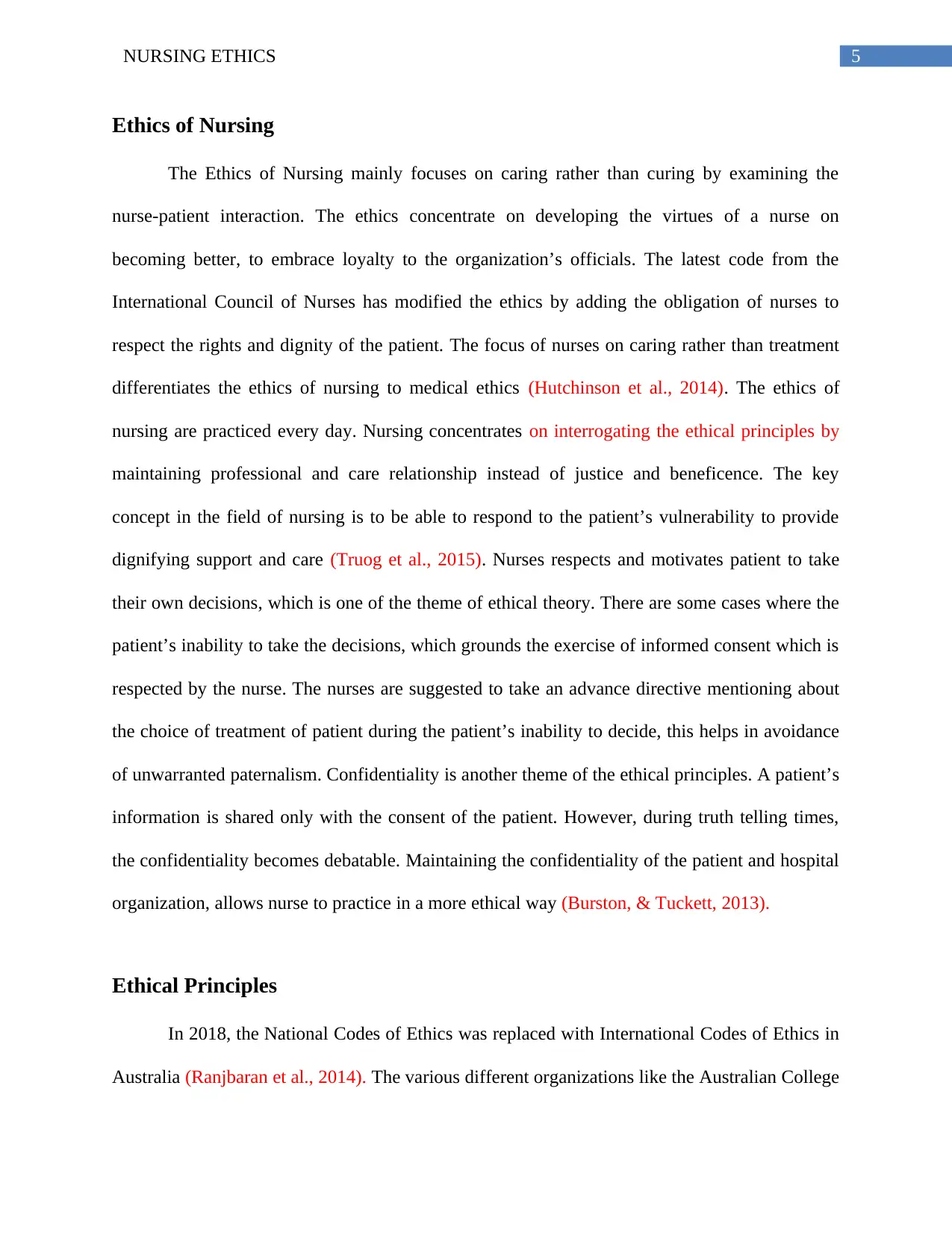
5NURSING ETHICS
Ethics of Nursing
The Ethics of Nursing mainly focuses on caring rather than curing by examining the
nurse-patient interaction. The ethics concentrate on developing the virtues of a nurse on
becoming better, to embrace loyalty to the organization’s officials. The latest code from the
International Council of Nurses has modified the ethics by adding the obligation of nurses to
respect the rights and dignity of the patient. The focus of nurses on caring rather than treatment
differentiates the ethics of nursing to medical ethics (Hutchinson et al., 2014). The ethics of
nursing are practiced every day. Nursing concentrates on interrogating the ethical principles by
maintaining professional and care relationship instead of justice and beneficence. The key
concept in the field of nursing is to be able to respond to the patient’s vulnerability to provide
dignifying support and care (Truog et al., 2015). Nurses respects and motivates patient to take
their own decisions, which is one of the theme of ethical theory. There are some cases where the
patient’s inability to take the decisions, which grounds the exercise of informed consent which is
respected by the nurse. The nurses are suggested to take an advance directive mentioning about
the choice of treatment of patient during the patient’s inability to decide, this helps in avoidance
of unwarranted paternalism. Confidentiality is another theme of the ethical principles. A patient’s
information is shared only with the consent of the patient. However, during truth telling times,
the confidentiality becomes debatable. Maintaining the confidentiality of the patient and hospital
organization, allows nurse to practice in a more ethical way (Burston, & Tuckett, 2013).
Ethical Principles
In 2018, the National Codes of Ethics was replaced with International Codes of Ethics in
Australia (Ranjbaran et al., 2014). The various different organizations like the Australian College
Ethics of Nursing
The Ethics of Nursing mainly focuses on caring rather than curing by examining the
nurse-patient interaction. The ethics concentrate on developing the virtues of a nurse on
becoming better, to embrace loyalty to the organization’s officials. The latest code from the
International Council of Nurses has modified the ethics by adding the obligation of nurses to
respect the rights and dignity of the patient. The focus of nurses on caring rather than treatment
differentiates the ethics of nursing to medical ethics (Hutchinson et al., 2014). The ethics of
nursing are practiced every day. Nursing concentrates on interrogating the ethical principles by
maintaining professional and care relationship instead of justice and beneficence. The key
concept in the field of nursing is to be able to respond to the patient’s vulnerability to provide
dignifying support and care (Truog et al., 2015). Nurses respects and motivates patient to take
their own decisions, which is one of the theme of ethical theory. There are some cases where the
patient’s inability to take the decisions, which grounds the exercise of informed consent which is
respected by the nurse. The nurses are suggested to take an advance directive mentioning about
the choice of treatment of patient during the patient’s inability to decide, this helps in avoidance
of unwarranted paternalism. Confidentiality is another theme of the ethical principles. A patient’s
information is shared only with the consent of the patient. However, during truth telling times,
the confidentiality becomes debatable. Maintaining the confidentiality of the patient and hospital
organization, allows nurse to practice in a more ethical way (Burston, & Tuckett, 2013).
Ethical Principles
In 2018, the National Codes of Ethics was replaced with International Codes of Ethics in
Australia (Ranjbaran et al., 2014). The various different organizations like the Australian College
⊘ This is a preview!⊘
Do you want full access?
Subscribe today to unlock all pages.

Trusted by 1+ million students worldwide
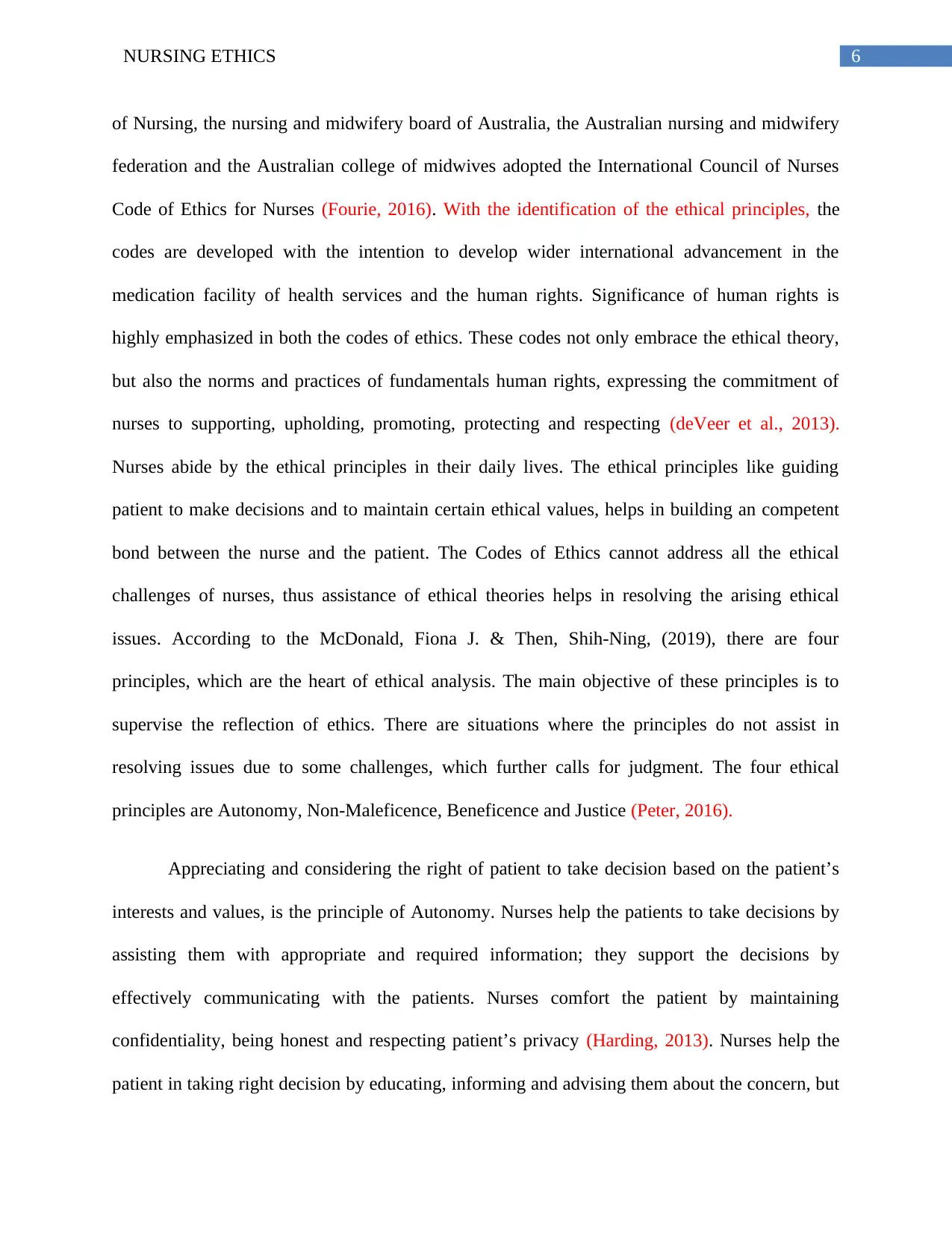
6NURSING ETHICS
of Nursing, the nursing and midwifery board of Australia, the Australian nursing and midwifery
federation and the Australian college of midwives adopted the International Council of Nurses
Code of Ethics for Nurses (Fourie, 2016). With the identification of the ethical principles, the
codes are developed with the intention to develop wider international advancement in the
medication facility of health services and the human rights. Significance of human rights is
highly emphasized in both the codes of ethics. These codes not only embrace the ethical theory,
but also the norms and practices of fundamentals human rights, expressing the commitment of
nurses to supporting, upholding, promoting, protecting and respecting (deVeer et al., 2013).
Nurses abide by the ethical principles in their daily lives. The ethical principles like guiding
patient to make decisions and to maintain certain ethical values, helps in building an competent
bond between the nurse and the patient. The Codes of Ethics cannot address all the ethical
challenges of nurses, thus assistance of ethical theories helps in resolving the arising ethical
issues. According to the McDonald, Fiona J. & Then, Shih-Ning, (2019), there are four
principles, which are the heart of ethical analysis. The main objective of these principles is to
supervise the reflection of ethics. There are situations where the principles do not assist in
resolving issues due to some challenges, which further calls for judgment. The four ethical
principles are Autonomy, Non-Maleficence, Beneficence and Justice (Peter, 2016).
Appreciating and considering the right of patient to take decision based on the patient’s
interests and values, is the principle of Autonomy. Nurses help the patients to take decisions by
assisting them with appropriate and required information; they support the decisions by
effectively communicating with the patients. Nurses comfort the patient by maintaining
confidentiality, being honest and respecting patient’s privacy (Harding, 2013). Nurses help the
patient in taking right decision by educating, informing and advising them about the concern, but
of Nursing, the nursing and midwifery board of Australia, the Australian nursing and midwifery
federation and the Australian college of midwives adopted the International Council of Nurses
Code of Ethics for Nurses (Fourie, 2016). With the identification of the ethical principles, the
codes are developed with the intention to develop wider international advancement in the
medication facility of health services and the human rights. Significance of human rights is
highly emphasized in both the codes of ethics. These codes not only embrace the ethical theory,
but also the norms and practices of fundamentals human rights, expressing the commitment of
nurses to supporting, upholding, promoting, protecting and respecting (deVeer et al., 2013).
Nurses abide by the ethical principles in their daily lives. The ethical principles like guiding
patient to make decisions and to maintain certain ethical values, helps in building an competent
bond between the nurse and the patient. The Codes of Ethics cannot address all the ethical
challenges of nurses, thus assistance of ethical theories helps in resolving the arising ethical
issues. According to the McDonald, Fiona J. & Then, Shih-Ning, (2019), there are four
principles, which are the heart of ethical analysis. The main objective of these principles is to
supervise the reflection of ethics. There are situations where the principles do not assist in
resolving issues due to some challenges, which further calls for judgment. The four ethical
principles are Autonomy, Non-Maleficence, Beneficence and Justice (Peter, 2016).
Appreciating and considering the right of patient to take decision based on the patient’s
interests and values, is the principle of Autonomy. Nurses help the patients to take decisions by
assisting them with appropriate and required information; they support the decisions by
effectively communicating with the patients. Nurses comfort the patient by maintaining
confidentiality, being honest and respecting patient’s privacy (Harding, 2013). Nurses help the
patient in taking right decision by educating, informing and advising them about the concern, but
Paraphrase This Document
Need a fresh take? Get an instant paraphrase of this document with our AI Paraphraser
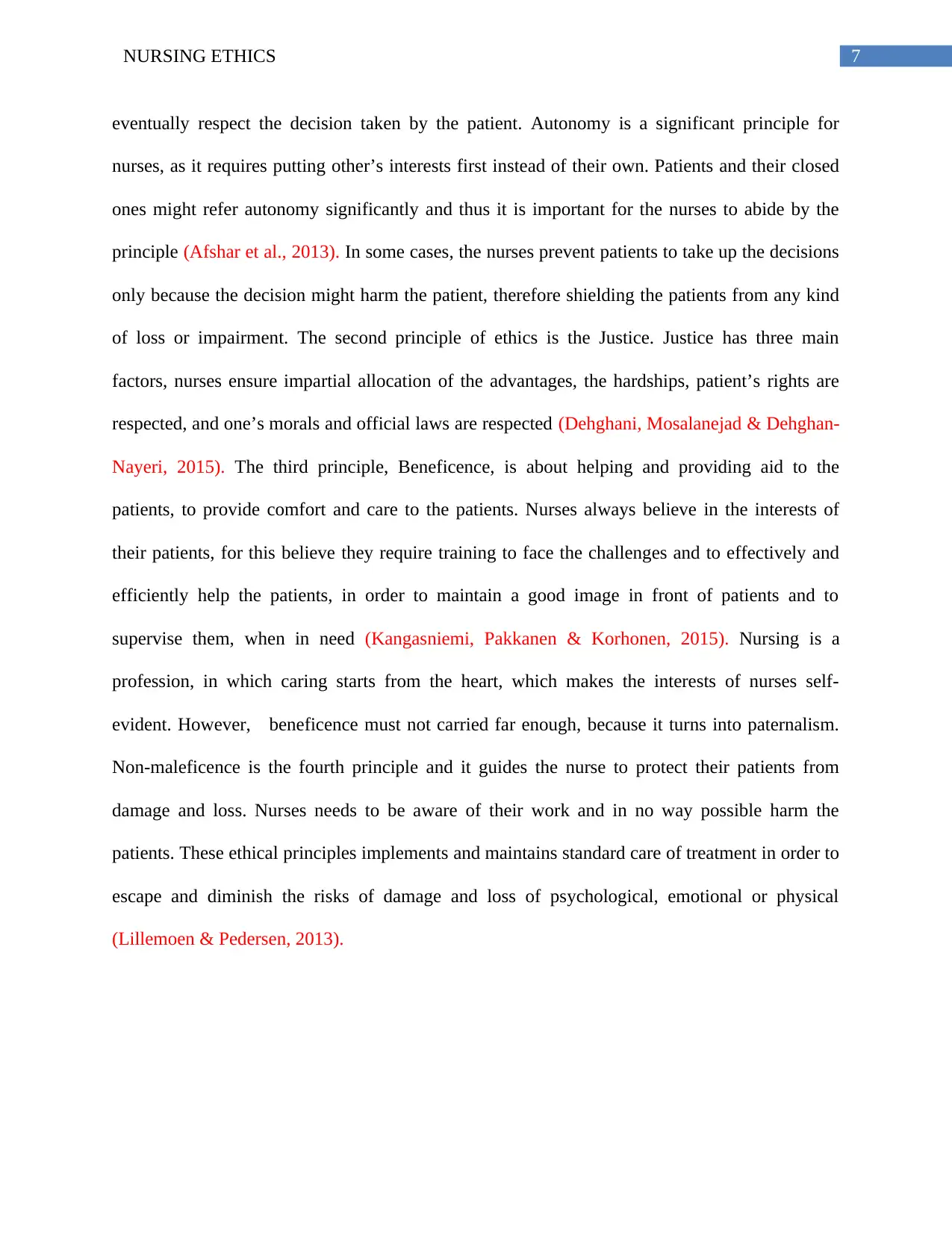
7NURSING ETHICS
eventually respect the decision taken by the patient. Autonomy is a significant principle for
nurses, as it requires putting other’s interests first instead of their own. Patients and their closed
ones might refer autonomy significantly and thus it is important for the nurses to abide by the
principle (Afshar et al., 2013). In some cases, the nurses prevent patients to take up the decisions
only because the decision might harm the patient, therefore shielding the patients from any kind
of loss or impairment. The second principle of ethics is the Justice. Justice has three main
factors, nurses ensure impartial allocation of the advantages, the hardships, patient’s rights are
respected, and one’s morals and official laws are respected (Dehghani, Mosalanejad & Dehghan-
Nayeri, 2015). The third principle, Beneficence, is about helping and providing aid to the
patients, to provide comfort and care to the patients. Nurses always believe in the interests of
their patients, for this believe they require training to face the challenges and to effectively and
efficiently help the patients, in order to maintain a good image in front of patients and to
supervise them, when in need (Kangasniemi, Pakkanen & Korhonen, 2015). Nursing is a
profession, in which caring starts from the heart, which makes the interests of nurses self-
evident. However, beneficence must not carried far enough, because it turns into paternalism.
Non-maleficence is the fourth principle and it guides the nurse to protect their patients from
damage and loss. Nurses needs to be aware of their work and in no way possible harm the
patients. These ethical principles implements and maintains standard care of treatment in order to
escape and diminish the risks of damage and loss of psychological, emotional or physical
(Lillemoen & Pedersen, 2013).
eventually respect the decision taken by the patient. Autonomy is a significant principle for
nurses, as it requires putting other’s interests first instead of their own. Patients and their closed
ones might refer autonomy significantly and thus it is important for the nurses to abide by the
principle (Afshar et al., 2013). In some cases, the nurses prevent patients to take up the decisions
only because the decision might harm the patient, therefore shielding the patients from any kind
of loss or impairment. The second principle of ethics is the Justice. Justice has three main
factors, nurses ensure impartial allocation of the advantages, the hardships, patient’s rights are
respected, and one’s morals and official laws are respected (Dehghani, Mosalanejad & Dehghan-
Nayeri, 2015). The third principle, Beneficence, is about helping and providing aid to the
patients, to provide comfort and care to the patients. Nurses always believe in the interests of
their patients, for this believe they require training to face the challenges and to effectively and
efficiently help the patients, in order to maintain a good image in front of patients and to
supervise them, when in need (Kangasniemi, Pakkanen & Korhonen, 2015). Nursing is a
profession, in which caring starts from the heart, which makes the interests of nurses self-
evident. However, beneficence must not carried far enough, because it turns into paternalism.
Non-maleficence is the fourth principle and it guides the nurse to protect their patients from
damage and loss. Nurses needs to be aware of their work and in no way possible harm the
patients. These ethical principles implements and maintains standard care of treatment in order to
escape and diminish the risks of damage and loss of psychological, emotional or physical
(Lillemoen & Pedersen, 2013).
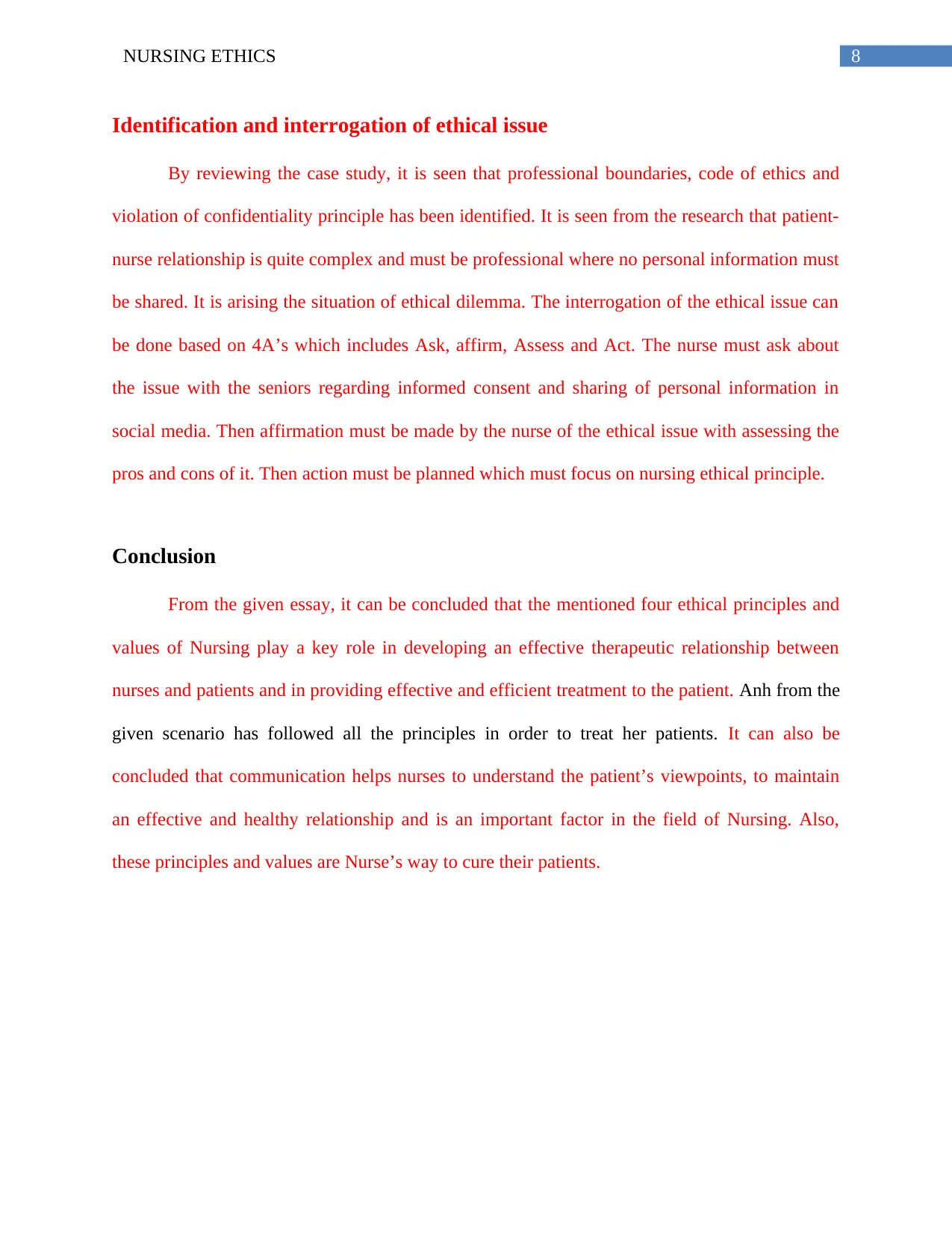
8NURSING ETHICS
Identification and interrogation of ethical issue
By reviewing the case study, it is seen that professional boundaries, code of ethics and
violation of confidentiality principle has been identified. It is seen from the research that patient-
nurse relationship is quite complex and must be professional where no personal information must
be shared. It is arising the situation of ethical dilemma. The interrogation of the ethical issue can
be done based on 4A’s which includes Ask, affirm, Assess and Act. The nurse must ask about
the issue with the seniors regarding informed consent and sharing of personal information in
social media. Then affirmation must be made by the nurse of the ethical issue with assessing the
pros and cons of it. Then action must be planned which must focus on nursing ethical principle.
Conclusion
From the given essay, it can be concluded that the mentioned four ethical principles and
values of Nursing play a key role in developing an effective therapeutic relationship between
nurses and patients and in providing effective and efficient treatment to the patient. Anh from the
given scenario has followed all the principles in order to treat her patients. It can also be
concluded that communication helps nurses to understand the patient’s viewpoints, to maintain
an effective and healthy relationship and is an important factor in the field of Nursing. Also,
these principles and values are Nurse’s way to cure their patients.
Identification and interrogation of ethical issue
By reviewing the case study, it is seen that professional boundaries, code of ethics and
violation of confidentiality principle has been identified. It is seen from the research that patient-
nurse relationship is quite complex and must be professional where no personal information must
be shared. It is arising the situation of ethical dilemma. The interrogation of the ethical issue can
be done based on 4A’s which includes Ask, affirm, Assess and Act. The nurse must ask about
the issue with the seniors regarding informed consent and sharing of personal information in
social media. Then affirmation must be made by the nurse of the ethical issue with assessing the
pros and cons of it. Then action must be planned which must focus on nursing ethical principle.
Conclusion
From the given essay, it can be concluded that the mentioned four ethical principles and
values of Nursing play a key role in developing an effective therapeutic relationship between
nurses and patients and in providing effective and efficient treatment to the patient. Anh from the
given scenario has followed all the principles in order to treat her patients. It can also be
concluded that communication helps nurses to understand the patient’s viewpoints, to maintain
an effective and healthy relationship and is an important factor in the field of Nursing. Also,
these principles and values are Nurse’s way to cure their patients.
⊘ This is a preview!⊘
Do you want full access?
Subscribe today to unlock all pages.

Trusted by 1+ million students worldwide
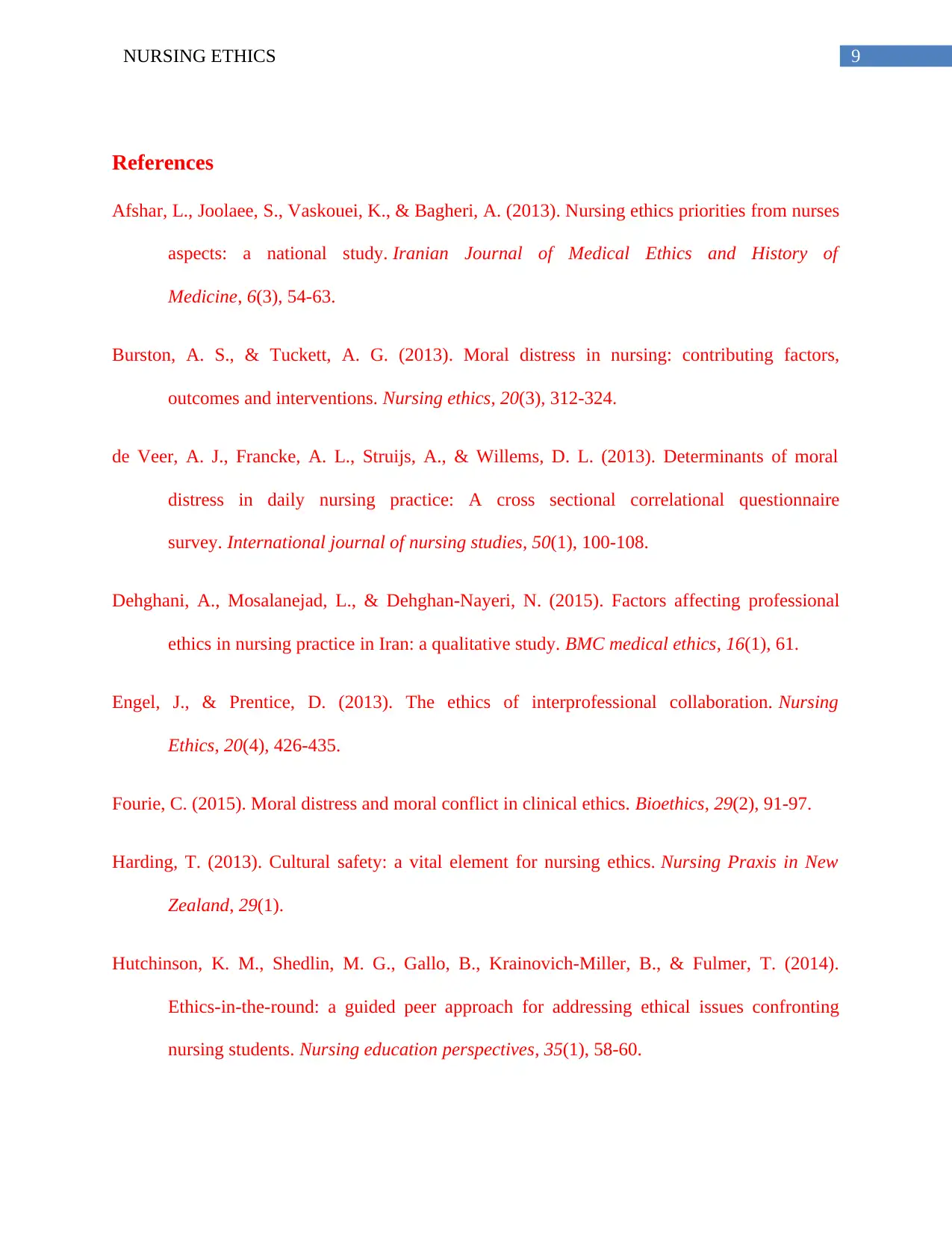
9NURSING ETHICS
References
Afshar, L., Joolaee, S., Vaskouei, K., & Bagheri, A. (2013). Nursing ethics priorities from nurses
aspects: a national study. Iranian Journal of Medical Ethics and History of
Medicine, 6(3), 54-63.
Burston, A. S., & Tuckett, A. G. (2013). Moral distress in nursing: contributing factors,
outcomes and interventions. Nursing ethics, 20(3), 312-324.
de Veer, A. J., Francke, A. L., Struijs, A., & Willems, D. L. (2013). Determinants of moral
distress in daily nursing practice: A cross sectional correlational questionnaire
survey. International journal of nursing studies, 50(1), 100-108.
Dehghani, A., Mosalanejad, L., & Dehghan-Nayeri, N. (2015). Factors affecting professional
ethics in nursing practice in Iran: a qualitative study. BMC medical ethics, 16(1), 61.
Engel, J., & Prentice, D. (2013). The ethics of interprofessional collaboration. Nursing
Ethics, 20(4), 426-435.
Fourie, C. (2015). Moral distress and moral conflict in clinical ethics. Bioethics, 29(2), 91-97.
Harding, T. (2013). Cultural safety: a vital element for nursing ethics. Nursing Praxis in New
Zealand, 29(1).
Hutchinson, K. M., Shedlin, M. G., Gallo, B., Krainovich-Miller, B., & Fulmer, T. (2014).
Ethics-in-the-round: a guided peer approach for addressing ethical issues confronting
nursing students. Nursing education perspectives, 35(1), 58-60.
References
Afshar, L., Joolaee, S., Vaskouei, K., & Bagheri, A. (2013). Nursing ethics priorities from nurses
aspects: a national study. Iranian Journal of Medical Ethics and History of
Medicine, 6(3), 54-63.
Burston, A. S., & Tuckett, A. G. (2013). Moral distress in nursing: contributing factors,
outcomes and interventions. Nursing ethics, 20(3), 312-324.
de Veer, A. J., Francke, A. L., Struijs, A., & Willems, D. L. (2013). Determinants of moral
distress in daily nursing practice: A cross sectional correlational questionnaire
survey. International journal of nursing studies, 50(1), 100-108.
Dehghani, A., Mosalanejad, L., & Dehghan-Nayeri, N. (2015). Factors affecting professional
ethics in nursing practice in Iran: a qualitative study. BMC medical ethics, 16(1), 61.
Engel, J., & Prentice, D. (2013). The ethics of interprofessional collaboration. Nursing
Ethics, 20(4), 426-435.
Fourie, C. (2015). Moral distress and moral conflict in clinical ethics. Bioethics, 29(2), 91-97.
Harding, T. (2013). Cultural safety: a vital element for nursing ethics. Nursing Praxis in New
Zealand, 29(1).
Hutchinson, K. M., Shedlin, M. G., Gallo, B., Krainovich-Miller, B., & Fulmer, T. (2014).
Ethics-in-the-round: a guided peer approach for addressing ethical issues confronting
nursing students. Nursing education perspectives, 35(1), 58-60.
Paraphrase This Document
Need a fresh take? Get an instant paraphrase of this document with our AI Paraphraser
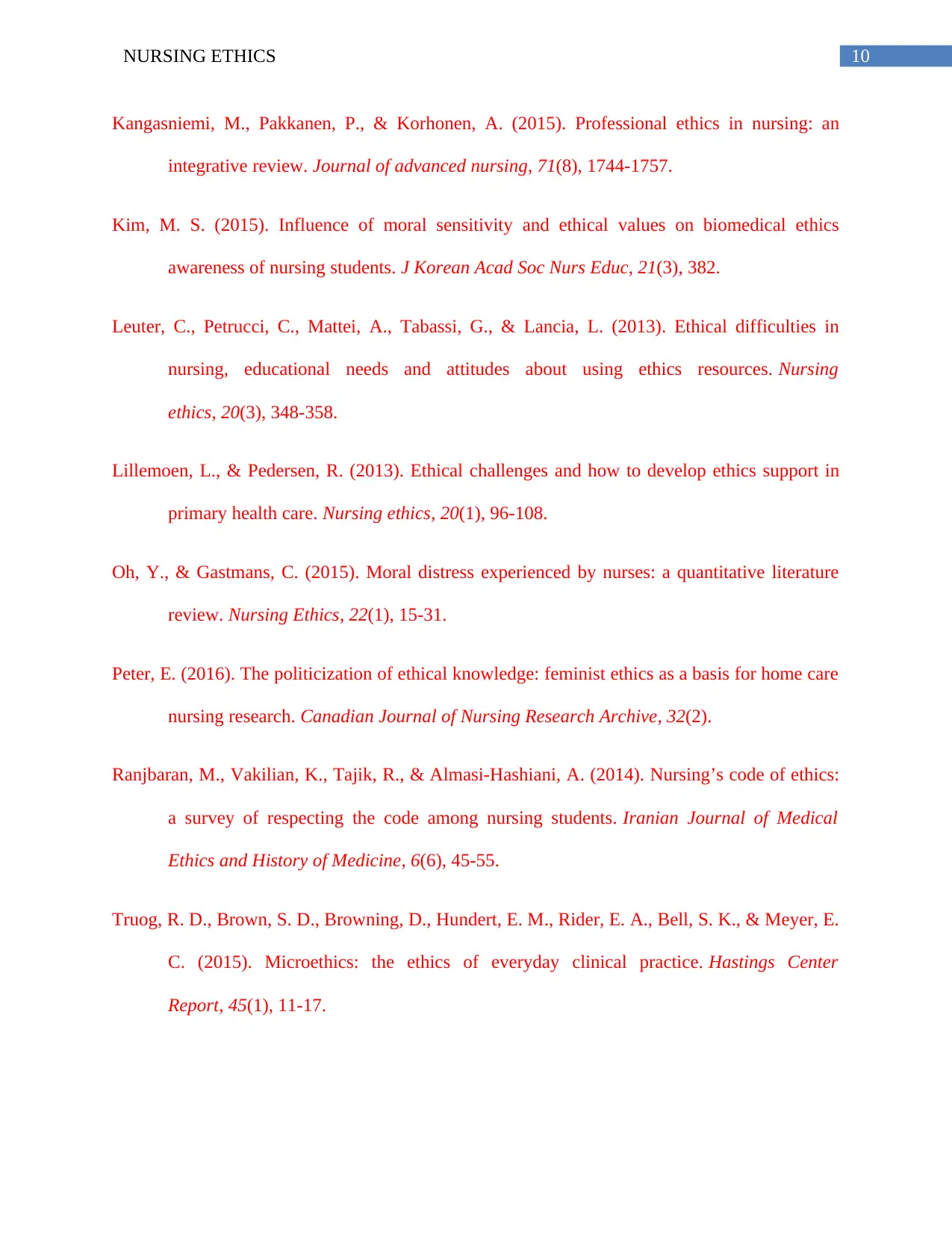
10NURSING ETHICS
Kangasniemi, M., Pakkanen, P., & Korhonen, A. (2015). Professional ethics in nursing: an
integrative review. Journal of advanced nursing, 71(8), 1744-1757.
Kim, M. S. (2015). Influence of moral sensitivity and ethical values on biomedical ethics
awareness of nursing students. J Korean Acad Soc Nurs Educ, 21(3), 382.
Leuter, C., Petrucci, C., Mattei, A., Tabassi, G., & Lancia, L. (2013). Ethical difficulties in
nursing, educational needs and attitudes about using ethics resources. Nursing
ethics, 20(3), 348-358.
Lillemoen, L., & Pedersen, R. (2013). Ethical challenges and how to develop ethics support in
primary health care. Nursing ethics, 20(1), 96-108.
Oh, Y., & Gastmans, C. (2015). Moral distress experienced by nurses: a quantitative literature
review. Nursing Ethics, 22(1), 15-31.
Peter, E. (2016). The politicization of ethical knowledge: feminist ethics as a basis for home care
nursing research. Canadian Journal of Nursing Research Archive, 32(2).
Ranjbaran, M., Vakilian, K., Tajik, R., & Almasi-Hashiani, A. (2014). Nursing’s code of ethics:
a survey of respecting the code among nursing students. Iranian Journal of Medical
Ethics and History of Medicine, 6(6), 45-55.
Truog, R. D., Brown, S. D., Browning, D., Hundert, E. M., Rider, E. A., Bell, S. K., & Meyer, E.
C. (2015). Microethics: the ethics of everyday clinical practice. Hastings Center
Report, 45(1), 11-17.
Kangasniemi, M., Pakkanen, P., & Korhonen, A. (2015). Professional ethics in nursing: an
integrative review. Journal of advanced nursing, 71(8), 1744-1757.
Kim, M. S. (2015). Influence of moral sensitivity and ethical values on biomedical ethics
awareness of nursing students. J Korean Acad Soc Nurs Educ, 21(3), 382.
Leuter, C., Petrucci, C., Mattei, A., Tabassi, G., & Lancia, L. (2013). Ethical difficulties in
nursing, educational needs and attitudes about using ethics resources. Nursing
ethics, 20(3), 348-358.
Lillemoen, L., & Pedersen, R. (2013). Ethical challenges and how to develop ethics support in
primary health care. Nursing ethics, 20(1), 96-108.
Oh, Y., & Gastmans, C. (2015). Moral distress experienced by nurses: a quantitative literature
review. Nursing Ethics, 22(1), 15-31.
Peter, E. (2016). The politicization of ethical knowledge: feminist ethics as a basis for home care
nursing research. Canadian Journal of Nursing Research Archive, 32(2).
Ranjbaran, M., Vakilian, K., Tajik, R., & Almasi-Hashiani, A. (2014). Nursing’s code of ethics:
a survey of respecting the code among nursing students. Iranian Journal of Medical
Ethics and History of Medicine, 6(6), 45-55.
Truog, R. D., Brown, S. D., Browning, D., Hundert, E. M., Rider, E. A., Bell, S. K., & Meyer, E.
C. (2015). Microethics: the ethics of everyday clinical practice. Hastings Center
Report, 45(1), 11-17.
1 out of 11
Related Documents
Your All-in-One AI-Powered Toolkit for Academic Success.
+13062052269
info@desklib.com
Available 24*7 on WhatsApp / Email
![[object Object]](/_next/static/media/star-bottom.7253800d.svg)
Unlock your academic potential
Copyright © 2020–2026 A2Z Services. All Rights Reserved. Developed and managed by ZUCOL.





